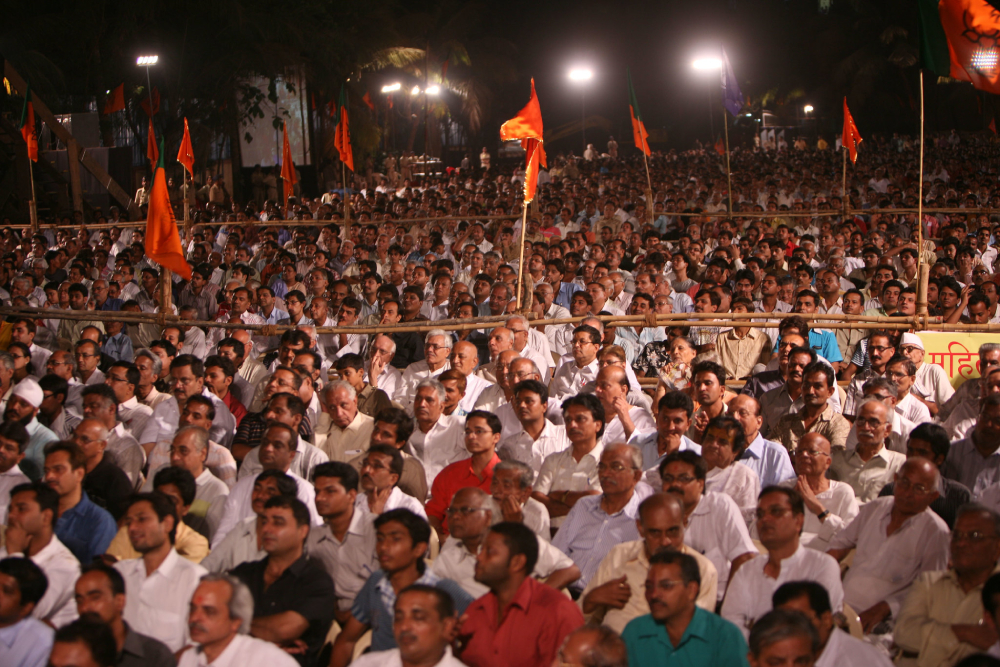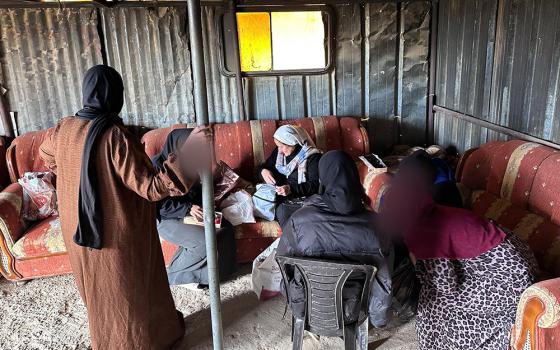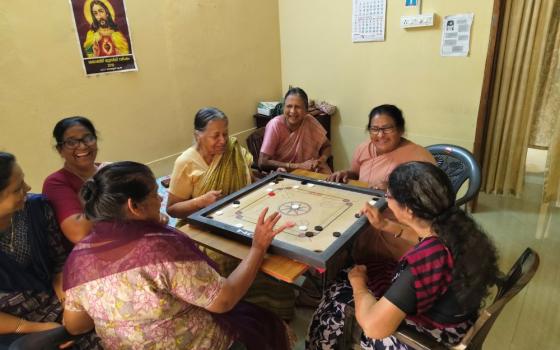
A ceramic "Make America Great Again" hat lies broken on the ground as people gather at Black Lives Matter Plaza in Washington Nov. 3, 2020. (CNS/Reuters/Hannah McKay)
Visualize a MAGA rally in the U.S., a Hindu nationalist rally in India, and a caravan halted at Hungary's border. Religion is weaponized to marginalize minorities and migrants, adding to the cauldron of exclusionary ideologies. As a theologian and psychologist, I wonder if this scenario is about more than just the far-right rising to power around the globe. To broaden my perspective, I have begun to relate these goings-on with the gamut of discriminatory phenomena like bullying (expressed through ragging) and neo-fascism (ending in genocide).
Who doesn't know about the suffering of indigenous peoples displaced by natural calamities, persecution, war and loss of livelihood from deforestation and mining? They are victims of forced migration and often further exploited and victimized in their host countries. Their prolonged and deep-seated wounds remain in the collective consciousness, to the extent that their descendants become perpetrators. Is this not the psychological dynamic of hazing in universities too? That is why I think most people who campaign and vote for right-wing politicians are not intentionally neo-fascist.

Supporters of India's Hindu nationalist Bharatiya Janata Party at a rally on April 26, 2009. (“BJP supporters”/Flickr/Al Jazeera English, CC BY-SA 2.0)
Rather, they are ragging or hazing with the hope of offering a conditional handshake to other minorities and immigrants in their country, saying: "We're open to new faces and ideas, provided you honor our established majoritarian religion, resources, and rights to enjoy them first. You'd better stay out there, in a corner, and don't dare question how we treat you!" Or: "Follow our rules, join us with respect for how great our nation and culture are, and we'll find common ground to move forward together."
Similar current affairs in the U.S. are greatly disturbing many around the globe. The depth and extent of fear, apprehension and turmoil experienced not only by first-generation immigrants to the country, but also by their dear ones who have birthright citizenship, is heart-wrenching. I have seen the tears of American men and women whose fiancées or spouses are immigrants. I have also listened to individuals who have lost their jobs after serving the marginalized with USAID for decades. Their anger, frustration and helplessness are palpable. Pastors are trying to console and accompany them spiritually.
Stock markets around the world are showing major upheavals because of uncertainties about Trump's tariff plans. Is he bullying other nations, hazing, or is he outright neo-fascist? God alone knows! In post-colonial India, I have seen a similar rise of nationalism and Hindutva over the recent decades, especially during the last 12 years of BJP rule. Are there deep-seated wounds in the shared consciousness of Hindus causing victims to become offenders? Otherwise, by and large, India as a civilization of civilizations has always been known for its inclusive and assimilative, but resilient spirit.

Guatemalan migrants deported from the U.S. under President Donald Trump's administration arrive at La Aurora Air Force Base in Guatemala City Jan. 27, 2025, on a flight from the U.S. (OSV News/Reuters/Cristina Chiquin)
Some political parties capitalize on people's religiosity to gain prominence and power. They seem to want the displaced to transmigrate to other planets! However, the common man or woman does not wish to go beyond ragging migrants and followers of minority religions. Somewhere down the line, I think the people of every nation have a collective conscience — something I would like to call a "civilian sense" — which is analogous to the sensus fidelium of the church. People cannot be taken for a ride in the name of religion for a long, long time. They can smell the truth and will begin asking for accountability from leaders they have entrusted with power.
This common sense, or "sense of the common," could be awakened either for peace or for civil war. I remember Nobel Peace Prize laureate Desmond Tutu's efforts to bring peace and reconciliation in South Africa, especially when he said: "If an elephant has its foot on the tail of a mouse and you say that you are neutral, the mouse will not appreciate your neutrality." Today, too, leaders of goodwill need to find ways not only to awaken the "civilian sense," but also to channel people's power for peaceful coexistence.
The global surge of religious nationalism and xenophobia distorts the Gospel call to welcome the hungry, thirsty, naked, sick, incarcerated and strangers (Matthew 25:35-40). Indian thinkers of goodwill have been struggling with the situation for over a decade and have largely processed it. On the other hand, Americans seem unprepared to respond deeply to the anti-immigrant sentiment emerging at the intersection of politics, economics and religion. Migrants are being framed as threats to a "Christian nation."
Advertisement
I think the resilience of India's pluralistic traditions and civil society, despite setbacks, could be a point of hope and caution for other nations. America, too, was described as a melting pot by Hector St. John de Crevecoeur, who wrote: "Here individuals of all nations are melted into a new race of men, whose labors and posterity will one day cause great changes in the world."
"Let God be Great Again" for each one of us, and God's reign come on earth as it is in heaven (Matthew 6:9-13). While we need to engage in public theology to challenge neo-fascist ideologies, I think analysis of the psychological dynamics of politicians and common people who behave like perpetrators through ragging and hazing is a must! Moreover, prophets who can read the signs of the times are vital for anticipating crises and guiding nations. With keen insight, they interpret subtle warnings — social unrest or political tensions — and deliver urgent, clear warnings to leaders. Their foresight stimulates timely action, averting catastrophes through wisdom and proactive responses rather than reactive counsel.






